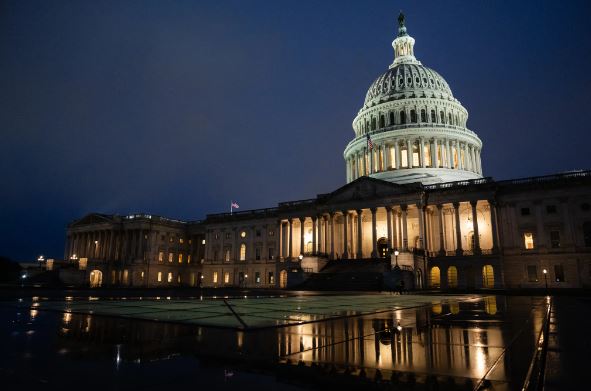A federal judge ruled on Friday that Senate Republicans may continue to pump tens of millions of dollars into key swing state races in the final days of the 2024 campaign by employing an unusual advertising strategy that Democrats had claimed was potentially illegal.
By reclassifying campaign ads as fund-raising appeals, Republicans have been able to avoid strict limits Congress has placed on spending by national party committees to aid individual candidates, helping to offset a significant fund-raising deficit they face in states with critical Senate races, such as Arizona and Pennsylvania.
House Democrats’ campaign arm sued the Federal Election Commission for failing to stop the Republicans and sought to either ban the practice or clear the way to use it themselves.
But Judge Randolph D. Moss, of the U.S. District Court in Washington, wrote Friday that he was “unpersuaded” to outlaw a practice that the commission had not. He said Democratic and Republican campaign committees — those that support Senate and House candidates — are “all on an even playing field” and the lack of action taken by the Federal Election Commission had not tilted it.
His ruling could give Republicans a last-minute boost in the fierce contest for the Senate, where they are favored to pick up the one or two seats they need to regain control of the chamber, but where polls show that several races are close.
Sean Cooksey, the Republican chairman of the Federal Election Commission, also welcomed the ruling. “This is a huge win for the rule of law and political speech!” he wrote on social media.
Julie Merz, the executive director of the Democratic Congressional Campaign Committee, said: “While we are disappointed that the court did not issue immediate relief against this cynical ploy by Republicans to circumvent campaign finance law, we are heartened by the judge’s observations on the merits of our case. The D.C.C.C. will evaluate next steps after the election to ensure that a small cadre of right-wing millionaires are not able to buy elections.”
Strict requirements govern when and how national parties can cover the cost of campaign advertisements for individual candidates. For so-called hybrid ads, they must split the cost with the candidate, and no more than half the ad can be about a specific race; at least as much time must be spent advocating general candidates of the party.
But the National Republican Senatorial Committee began running tens of millions of dollars’ worth of ads aiding individual candidates by categorizing them as joint fund-raising appeals in what Democrats alleged was an end-run around the contribution rules. Those fund-raising appeals are subject to a different set of regulations that allow coordination and place no limits on content beyond that it must include a solicitation.
Republicans did so by adding a “donate now” appeal in the last few seconds of the ad with a QR code that links to a donation page for a joint fund-raising committee established between the committee and the Republican candidate.
The Democrats faulted the Federal Election Commission for failing to render an opinion as to whether the Republicans’ practices were legal. But the commission, which is charged with enforcing federal campaign finance laws, deadlocked 3 to 3 along party lines, and did not issue a decision on the matter.
The Republicans’ lawyers countered that the advertising strategy “is not a new phenomenon,” citing tactics used during the presidential campaigns of President Barack Obama, former Secretary of State Hillary Clinton and Vice President Joseph R. Biden Jr.
Moreover, the Republicans said, House Democrats are complaining about a tactic that Senate Democrats have also used during this campaign cycle. (House Democrats say the ads in question are only online and better align with the spirit of the law.)
“Although we’re disappointed in Democrats’ desperate attempt to suppress party speech — instead of winning at the ballot box — we’re grateful the court reached the correct decision,” Ryan G. Dollar, the general counsel for the National Republican Senatorial Committee, said in a statement applauding the judge’s decision, adding that the committee would “continue to do whatever it takes to win, in compliance with federal campaign finance laws.”

